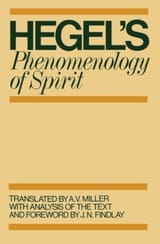Anonymous
7/18/2025, 12:50:49 AM No.24559689
Alright I fell for the memes and bought this book and I must say it slaps. The preface alone is gold, he systematically destroys every false conception of philosophy there is, from the mystics who think arguments are just window-dressing for supernatural gnosis, to the pseuds who think philosophy is accessible to common sense and doesn't require any hard studying, or who think philosophy should be edifying or contain life lessons.
When you get into the book itself he drops you right off the deep end with the one and the many. He leads you through movements of consciousness from immediate sense perception, which turns out to require the universal (the 'this', the 'now); then this universal of perception collapses, basically because you can't distinguish its unity from its parts; then into the supersensible, which starts off as a mysterious void or holy realm and then becomes the unity of simple, ultimate laws, then the understanding affirms the differences within these laws, so law itself becomes a one-many, until:
"This simple infinity, or the absolute concept, is to be called the simple essence of life, the soul of the world, the universal bloodstream, which is omnipresent, neither dulled nor interrupted by any difference, which is instead itself both every difference as well as their sublatedness."
He writes technical prose but mixes it with grace and humor. This book also absolutely filters retards, you will find almost nothing online to read about it worth reading. I found a few reddit posts about the Force and Understanding section and they were both awful (one claimed it's about Schelling, I guess because he mentioned magnetism; another claimed the 'inverted world' is a reductio ad absurdum, when it's actually integral to the transition to self-consciousness, and is about how any simple aspect of a law also contains its inversion, i.e. punishment of a crime is not commission of crime but it 'contains' commission as its inversion, or the north pole is not the south pole but it 'contains' the south pole, etc.)
General Hegel thread.
When you get into the book itself he drops you right off the deep end with the one and the many. He leads you through movements of consciousness from immediate sense perception, which turns out to require the universal (the 'this', the 'now); then this universal of perception collapses, basically because you can't distinguish its unity from its parts; then into the supersensible, which starts off as a mysterious void or holy realm and then becomes the unity of simple, ultimate laws, then the understanding affirms the differences within these laws, so law itself becomes a one-many, until:
"This simple infinity, or the absolute concept, is to be called the simple essence of life, the soul of the world, the universal bloodstream, which is omnipresent, neither dulled nor interrupted by any difference, which is instead itself both every difference as well as their sublatedness."
He writes technical prose but mixes it with grace and humor. This book also absolutely filters retards, you will find almost nothing online to read about it worth reading. I found a few reddit posts about the Force and Understanding section and they were both awful (one claimed it's about Schelling, I guess because he mentioned magnetism; another claimed the 'inverted world' is a reductio ad absurdum, when it's actually integral to the transition to self-consciousness, and is about how any simple aspect of a law also contains its inversion, i.e. punishment of a crime is not commission of crime but it 'contains' commission as its inversion, or the north pole is not the south pole but it 'contains' the south pole, etc.)
General Hegel thread.
Replies:
